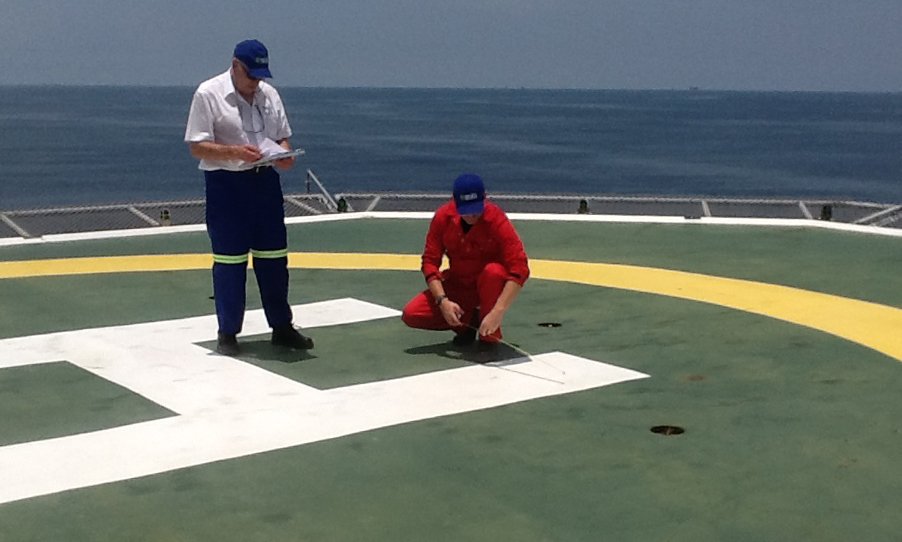Ensuring safety above all: Helideck Certification-Africa provides inspections for offshore operations
Offshore operations are a crucial component of the global energy industry, providing a significant proportion of the world’s oil and gas production. Helidecks, the designated landing areas for helicopters on offshore platforms, play a pivotal role in facilitating crew changes, emergency evacuations and the transport of essential equipment. Ensuring the safety and functionality of these helidecks is paramount, which is why helideck inspections have become an indispensable part of offshore operations.

The importance of helideck inspections
Helidecks are exposed to harsh environmental conditions, including corrosive salt water, extreme temperatures and heavy machinery usage. Regular inspections are essential to maintain their structural integrity and safety standards. Here are some of the key reasons why helideck inspections are crucial:
- Safety: Safety is the top priority in offshore operations. Helicopters carry personnel and cargo to and from platforms, and any malfunction or damage to the helideck could result in catastrophic accidents. Inspections help identify and rectify potential hazards.
- Regulatory Compliance: various international and national regulations, such as UKCAA CAP 437, International Maritime Organisation’s (IMO) guidelines and the USA Coast Guard (USCG) requirements, mandate regular helideck inspections. Compliance ensures that offshore operators meet the highest safety standards.
- Asset protection: Helidecks are expensive assets. Regular inspections and maintenance help extend their lifespan and reduce the risk of costly repairs or replacements.
- Environmental factors: Offshore platforms are exposed to extreme weather conditions. Inspections can detect corrosion and other damage caused by salt water exposure, ensuring the helideck’s durability.
The Inspection Process
Helideck Certification-Africa is ISO9001:2015 Approved and all inspections are conducted in accordance with this Quality Management Standard. Inspections involve a comprehensive evaluation of various components and systems. The process typically includes:
- Visual inspections: Inspectors examine the helidecks surface, including the perimeter net, for signs of wear, corrosion or damage. In addition, all markings and positionings are checked and measured to ensure compliance with latest regulations. A friction test of the surface is carried out, using the only UKCAA approved friction tester, namely the Findlay Irvine Micro Grip friction tester. The surrounding areas, both horizontally and vertically, are checked to ensure compliance with the required obstacle-free requirements.
- Structural Assessment: The helideck’s structural integrity is assessed to ensure it can withstand the weight and impact of helicopters during takeoff and landing.
- Fire Fighting equipment: Inspectors verify that fire fighting equipment, including foam and water deluge systems, are operational to respond to potential helicopter accidents or fuel spills.
- Communication Systems: The communication systems, such as the radios and status indicators, are tested to ensure clear and efficient communication with incoming and departing helicopters.
- Weather Monitoring: Weather conditions play a significant role in helicopter operations. Helideck inspections include the HMS (helideck Monitoring System) which reports vital information such as wind, temperature, and pitch, roll and heave to ensure real-time weather data is provided, helping operators make informed decisions.
- Helideck Crew: To carry out effective control of the helideck and its operations, the helideck crew must be trained, and be able to operate, to the highest level for all helicopter operations. This includes controlled and effective responses to all potential emergencies. Helideck inspections include the verification that each crew member can carry out his role effectively, under all circumstances.
Conclusion
Helideck inspections are a critical aspect of offshore operations, guaranteeing the safety of personnel, the integrity of assets, and compliance with regulations. By proactively identifying and addressing potential issues, offshore operators can continue their essential work while minimizing risks and environmental impact. As the energy industry evolves, helideck inspections remain an essential tool for ensuring safety above all else.
Helideck Certification-Africa, as part of the Flight Safety Group (Australia), has established an impeccable record of accurate, in-depth inspections in line with all the major International Standards and Regulations, assuring our clients of the highest level of safety available.
